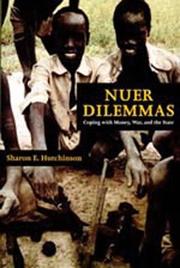| Listing 1 - 7 of 7 |
Sort by
|
Book
ISBN: 9122012834 Year: 1989 Volume: vol 1988-1989/1 Publisher: Stockholm Almqvist & Wiksell International
Abstract | Keywords | Export | Availability | Bookmark
 Loading...
Loading...Choose an application
- Reference Manager
- EndNote
- RefWorks (Direct export to RefWorks)
Nuer (African people) --- Naadh (African people) --- Naath (African people) --- Nuer (African tribe) --- Ethnology --- Nilotic peoples --- Social life and customs --- Social life and customs.
Book
ISBN: 0714626899 Year: 1970 Volume: 95 Publisher: London Cass
Abstract | Keywords | Export | Availability | Bookmark
 Loading...
Loading...Choose an application
- Reference Manager
- EndNote
- RefWorks (Direct export to RefWorks)
Nuer (African people) --- Folklore --- Nuer (Peuple d'Afrique) --- -Nuer (African people) --- -Folk beliefs --- Folk-lore --- Traditions --- Ethnology --- Manners and customs --- Material culture --- Mythology --- Oral tradition --- Storytelling --- Naadh (African people) --- Naath (African people) --- Nuer (African tribe) --- Nilotic peoples --- Folklore. --- -Folklore --- Nuer (African people). --- Folk beliefs
Book
ISBN: 052124563X 0521271010 0511558740 9780521245630 9780511558740 9780521271011 Year: 1983 Volume: 38 Publisher: Cambridge Cambridge University press
Abstract | Keywords | Export | Availability | Bookmark
 Loading...
Loading...Choose an application
- Reference Manager
- EndNote
- RefWorks (Direct export to RefWorks)
This book addresses several of the classic questions in African Studies. In the pre-colonial era what were the sources of order in societies without states? And what were the origins of 'traditional' states in Africa? In the colonial period, what caused the divergent patterns of agricultural development? And what were the issues that drove the peasantry into the rebellions which brought an end to colonial rule? Since independence what has been the fate of the African peasantry? What has been the content of the agricultural policies adopted by the governments of Africa? And how can these policies be accounted for? In answering these questions, the book explores various forms of explanation and advances a form of political economy based upon rational-choice analysis.
Third World: economic development problems --- Africa --- Economic conditions. --- Agriculture --- -Agriculture and state --- -Nuer (African people) --- Peasantry --- -Peasantry --- Agricultural laborers --- Rural population --- Marks (Medieval land tenure) --- Villeinage --- Naadh (African people) --- Naath (African people) --- Nuer (African tribe) --- Ethnology --- Nilotic peoples --- Agrarian question --- Agricultural policy --- State and agriculture --- Economic policy --- Land reform --- Farming --- Husbandry --- Industrial arts --- Life sciences --- Food supply --- Land use, Rural --- Economic aspects --- -Government policy --- Eastern Hemisphere --- Rural conditions. --- Agriculture and state --- Nuer (African people) --- Peasants --- Nuer (African people). --- -Economic aspects --- -Africa --- Developing countries: economic development problems --- Social Sciences --- Political Science --- Africa - Economic conditions.
Book
ISBN: 0857450891 0857450883 Year: 2011 Publisher: New York : Berghahn Books,
Abstract | Keywords | Export | Availability | Bookmark
 Loading...
Loading...Choose an application
- Reference Manager
- EndNote
- RefWorks (Direct export to RefWorks)
Focusing on ethnicity and its relation to conflict, this book goes beyond sterile debates about whether ethnic identities are 'natural' or 'socially constructed'. Rather, ethnic identity takes different forms. Some ethnic boundaries are perceived by the actors themselves as natural, while others are perceived to be permeable. The argument is substantiated through a comparative analysis of ethnic identity formation and ethnic conflict among the Anywaa and the Nuer in the Gambella region of western Ethiopia. The Anywaa and the Nuer are not just two ethnic groups but two kinds of ethnic groups. C
Anuak (African people) --- Nuer (African people) --- Ethnicity --- Ethnic identity. --- Gambēla Āstedader Ākababī (Ethiopia) --- Ethnic relations. --- Anuaks --- Anwak (African people) --- Anyuak (African people) --- Anywaa (African people) --- Anywak (African people) --- Anywaq (African people) --- Dho Anywaa (African people) --- Jambo (African people) --- Nuro (African people) --- Yambo (African people) --- Ethnology --- Lwoo (African people) --- Nilotic peoples --- Ethnic identity --- Group identity --- Cultural fusion --- Multiculturalism --- Cultural pluralism --- Naadh (African people) --- Naath (African people) --- Nuer (African tribe) --- Gambēla (Ethiopia : Administrative region) --- Gambella Region (Ethiopia) --- YaʼGāmbélā ḥezboč kelel (Ethiopia) --- Gambela Peoples Regional National State (Ethiopia) --- Gambella Federal State (Ethiopia) --- Region 12 (Ethiopia) --- Gambela Astedader Akababi (Ethiopia)
Book
ISBN: 1782043802 1782043810 1322293937 1847010997 Year: 2014 Publisher: Woodbridge, Suffolk ; Rochester, NY (US) : James Currey,
Abstract | Keywords | Export | Availability | Bookmark
 Loading...
Loading...Choose an application
- Reference Manager
- EndNote
- RefWorks (Direct export to RefWorks)
Joint Winner of the Amaury Talbot Prize for African Anthropology 2014. How and where did returning Nuer refugees make their 'homes' in southern Sudan? How were gender relations and identity redefined as a result of war, displacement and return to post-war communities? And how were those displaced able to recreate a sense of home, community and nation? During the civil wars in southern Sudan (1983-2005) many of the displaced Sudanese, including many Nuer, were in refugee camps in Kenya and Ethiopia. In the aftermath of the Comprehensive Peace Agreement, they repatriated to southern Sudan. Faced with finding long-lost relatives and local expectations of 'proper behaviour', they often felt displaced again. This book follows the lives of a group of Nuer in the Greater Upper Nile region. The narratives of those displaced and those who stayed behind reveal the complexity of social change, in particular, the crucial yet relatively unconsidered transformation of gender and generational relations, and how this has impacted on state formation in what is now South Sudan. Katarzyna Grabska is a research fellow with the Department of Anthropology and Sociology of Development at the Graduate Institute of International and Development Studies in Geneva. She is co-editor (with Lyla Mehta), of Forced Displacement: Why Rights Matter? (Palgrave: 2008)
Nuer (African people) --- Sudan. --- Sudan --- History --- Naadh (African people) --- Naath (African people) --- Nuer (African tribe) --- Ethnology --- Nilotic peoples --- Sudan, Egyptian --- Anglo-Egyptian Sudan --- Anglo-Egipetskiĭ Sudan --- Egyptian Sudan --- Democratic Republic of the Sudan --- Republic of the Sudan --- Jumhūrīyat al-Sūdān al-Dīmuqrāṭīyah --- Soudan --- Demokraticheskai︠a︡ Respublika Sudan --- Sudan (Democratic Republic) --- Jamhuryat es-Sudan --- Republic of Sudan --- Jumhūriyyat as-Sūdān --- Jumhuriyat as-Sudan --- As-Sudan --- Lado Enclave (Congo Free State) --- Refugees --- Women refugees --- Group identity --- Sex role --- Repatriation --- Return migration --- Attitudes. --- Social aspects --- South Sudan --- Social conditions. --- African Anthropology. --- Gender Relations. --- Identity. --- Katarzyna Grabska. --- Nuer. --- Repatriation. --- Southern Sudan. --- War.

ISBN: 9780198279075 0198279078 Year: 1994 Publisher: Oxford : Clarendon Press,
Abstract | Keywords | Export | Availability | Bookmark
 Loading...
Loading...Choose an application
- Reference Manager
- EndNote
- RefWorks (Direct export to RefWorks)
Nuer (African people) --- Prophecy --- Prophets --- Nuer (Peuple d'Afrique) --- Prophéties --- Prophètes --- Religious life --- History --- Vie religieuse --- Histoire --- Sudan --- Soudan --- Religion --- #SBIB:39A10 --- #SBIB:39A73 --- #SBIB:96G --- -Prophecy --- -Prophets --- -Nuer (African people) --- -Naadh (African people) --- Naath (African people) --- Nuer (African tribe) --- Ethnology --- Nilotic peoples --- Minor prophets --- Prophethood --- Seers --- Persons --- Forecasting --- Antropologie: religie, riten, magie, hekserij --- Etnografie: Afrika --- Geschiedenis van Afrika --- -History --- -Religion --- Religion. --- -Antropologie: religie, riten, magie, hekserij --- Prophéties --- Prophètes --- Naadh (African people) --- Sudan, Egyptian --- Anglo-Egyptian Sudan --- Anglo-Egipetskiĭ Sudan --- Egyptian Sudan --- Democratic Republic of the Sudan --- Republic of the Sudan --- Jumhūrīyat al-Sūdān al-Dīmuqrāṭīyah --- Demokraticheskai︠a︡ Respublika Sudan --- Sudan (Democratic Republic) --- Jamhuryat es-Sudan --- Republic of Sudan --- Jumhūriyyat as-Sūdān --- Jumhuriyat as-Sudan --- As-Sudan --- Lado Enclave (Congo Free State)

ISBN: 0520202848 0520088697 9780520202849 Year: 1996 Publisher: Berkeley, Calif. University of California Press
Abstract | Keywords | Export | Availability | Bookmark
 Loading...
Loading...Choose an application
- Reference Manager
- EndNote
- RefWorks (Direct export to RefWorks)
Through the pioneering efforts of the famed British anthropologist E. E. Evans-Pritchard, the Nuer of southern Sudan have become one of anthropology's most celebrated case studies. Now Sharon Hutchinson combines fresh ethnographic evidence and contemporary theoretical perspectives to show not only what has happened to the Nuer since their 1930s encounters with Evans-Pritchard, but, more importantly, what is to be gained from a thoroughly historicized treatment of ethnographic materials. Hutchinson's work provides a vision for what anthropology has become in the 1990s. Concentrating on Nuer perceptions, experiences, and evaluations of change, Hutchinson traces the historical conditions that have led contemporary men and women to reconsider fundamental aspects of their lives. She raises a number of important issues that Evans-Pritchard did not: How can we move beyond static structural models based on notions of cultural "boundedness," "homogeneity," and "order"? How have Nuer people been actively reshaping and reassessing local forms of power in light of dramatic economic shifts, religious proselytizing, civil war, and colonial and postcolonial rule? Hutchinson has produced a rich ethnographic document that offers a new rhetorical strategy for writing ethnographies that is processual, dialogical, and reflexive all at once.
Social problems --- Polemology --- Internal politics --- Sudan --- Nuer (African people) --- Nuer (Peuple d'Afrique) --- Economic conditions --- Politics and government --- Social conditions --- Conditions économiques --- Politique et gouvernement --- Conditions sociales --- Soudan --- Ethnic relations --- Relations interethniques --- #SBIB:39A73 --- #SBIB:39A11 --- Etnografie: Afrika --- Antropologie : socio-politieke structuren en relaties --- Social Sciences and Humanities. Cultural Anthropology --- Economic conditions. --- Politics and government. --- Social conditions. --- Cultural Anthropology (General) --- Ethnic relations. --- Cultural Anthropology (General). --- Nuer (peuple d'Afrique) --- Ethnologie --- Conditions économiques --- Naadh (African people) --- Naath (African people) --- Nuer (African tribe) --- Ethnology --- Nilotic peoples --- Sudan, Egyptian --- Anglo-Egyptian Sudan --- Anglo-Egipetskiĭ Sudan --- Egyptian Sudan --- Democratic Republic of the Sudan --- Republic of the Sudan --- Jumhūrīyat al-Sūdān al-Dīmuqrāṭīyah --- Demokraticheskai︠a︡ Respublika Sudan --- Sudan (Democratic Republic) --- Jamhuryat es-Sudan --- Republic of Sudan --- Jumhūriyyat as-Sūdān --- Lado Enclave (Congo Free State) --- Conditions sociales. --- Conditions économiques. --- Politique et gouvernement. --- Jumhuriyat as-Sudan --- As-Sudan --- Nuer (African people) - Social conditions --- Nuer (African people) - Economic conditions --- Nuer (African people) - Politics and government --- Sudan - Ethnic relations --- Sudan - Politics and government --- Conditions économiques.
| Listing 1 - 7 of 7 |
Sort by
|

 Search
Search Feedback
Feedback About UniCat
About UniCat  Help
Help News
News